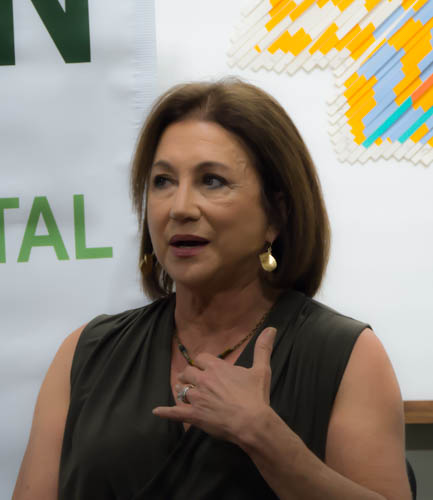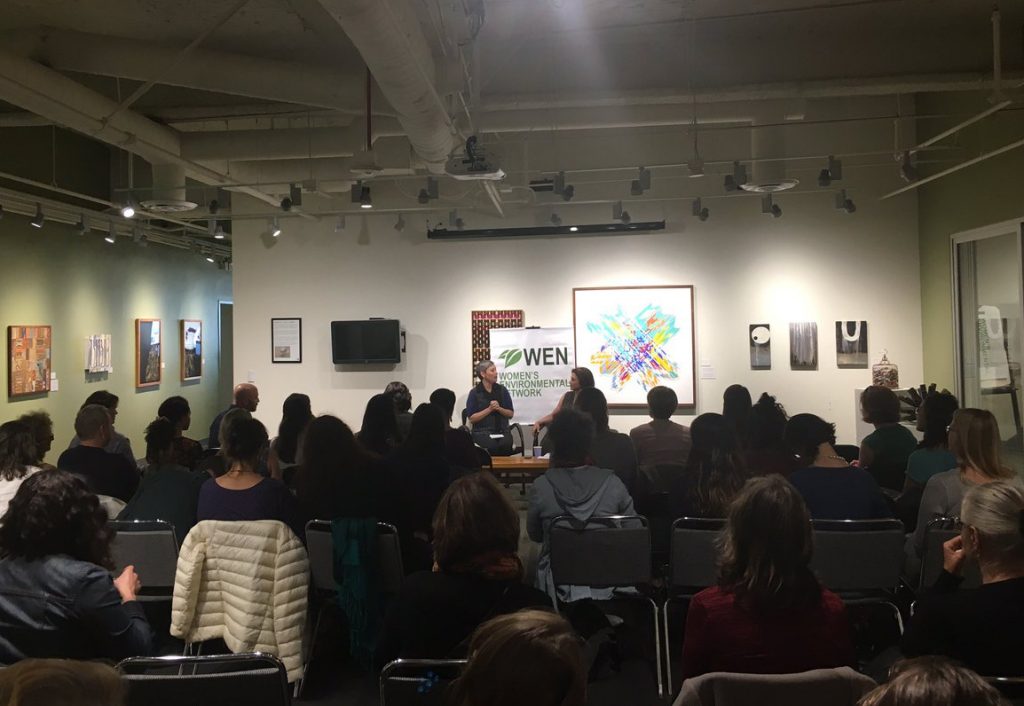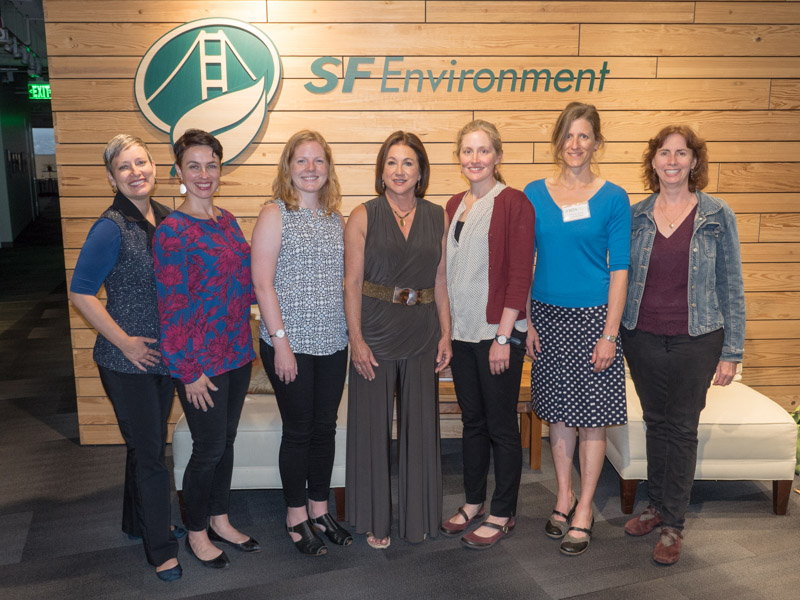Event recap: WEN in Conversation with Environmental Journalist and Media Expert Betsy Rosenberg
On July 26, 2017, WEN hosted an event to explore how we can make media coverage of environmental issues more mainstream and to learn, in this new political climate, how environmental communications and reporting have changed. We are grateful to friends and colleagues who inspired this event and to San Francisco Environment for hosting. The sold-out gathering, attended by women and men representing all sectors (nonprofit, government, for-profit, academia), showed us that we hold the opportunity to band together, across disciplines, to leverage positive social change with stronger media coverage of environmental issues. To keep the conversation going, WEN Board Member Judy Frauman penned a recap on the details of the conversation.
-Christine Sculati, Anna Gore, and Nikole Reaksecker
WEN Board Members and Environment + Media Event Organizers
By Judy Frauman
The Women’s Environmental Network recently hosted a conversation with Betsy Rosenberg, an environmental media expert, who spoke with strong, and sometimes fiery, passion about the current state of our environment and climate change. Throughout her career, Betsy has brought a broad range of environmental topics to progressive audiences as a radio broadcaster and podcast host. In a world where mainstream media has treated the environment as an optional interest, she has been pushing for years to change that and to establish regularly scheduled coverage centered on environmental issues.
 Sitting in the audience that evening and listening to the stories of her childhood, her career, and her unending mission to shout out to the world about the condition of our planet, one gets the impression that it must have been hard-wired into her genes: even as a child in grade school, she was appalled by kids who tossed their food from their lunchboxes straight into the trash. This was the start of what has become a long and obsessive journey to learn about the health of our planet and to spread the word to others. It’s what Betsy referred to as “my environmental illness: I couldn’t stop if I wanted to.”
Sitting in the audience that evening and listening to the stories of her childhood, her career, and her unending mission to shout out to the world about the condition of our planet, one gets the impression that it must have been hard-wired into her genes: even as a child in grade school, she was appalled by kids who tossed their food from their lunchboxes straight into the trash. This was the start of what has become a long and obsessive journey to learn about the health of our planet and to spread the word to others. It’s what Betsy referred to as “my environmental illness: I couldn’t stop if I wanted to.”
Members of WEN heard this story and many others from a woman whose career has traversed the media world hoping to spread the message about the perils of our planet, and in so doing, inspire a wide audience to wake up and take action.
Mainstream media has treated the environment as an optional interest. “We are eco-illiterate in this country,” Betsy said. She has been pushing for a long time to get environmental issues into mainstream media. Her two-decade career as a broadcast journalist has given her an inside look at possible reasons for a dearth of environmental journalism: As she pointed out during her talk, there isn’t a single one-hour broadcasted show in the United States that is dedicated to environmental issues. There are plenty of shows on politics, on finance, on religion, but no content reaching a broad audience that is fully dedicated to the environment. She offered one explanation: it has been historically difficult to get sponsors for this kind of show. She has experienced pushback from mainstream news editors who, when asked to do more stories that cover solutions to environmental issues, respond with “that’s not our job. That belongs to [groups like] the Sierra Club.” One glimmer of hope in the media is CNN’s receptivity at exploring a news program dedicated to the environment. This change of heart by CNN coincides with the election of Donald Trump, and is a possible silver lining in the cloud this administration has cast in its appointments to the Environmental Protection Agency and its dramatic slash in the EPA’s budget. [Note: In the time between writing this article and its publication, we have learned that CNN did not come through on an environmentally dedicated news program after all.] With the plethora of issues and people working on the environment and climate change, Betsy knows there is enough material to put together an interview or story every day of the year.
 The moderator for the evening and WEN board member, Nikole Reaksecker, asked Betsy a question that was likely on the minds of many of the attendees: “What is the most effective strategy to address a situation so grave [as climate change and the environment]?” Betsy’s response began with the statement that we are hovering between denial and despair. She said it’s important for us not only to define the problems, ones that are steeped in complexity, but also to include solutions.
The moderator for the evening and WEN board member, Nikole Reaksecker, asked Betsy a question that was likely on the minds of many of the attendees: “What is the most effective strategy to address a situation so grave [as climate change and the environment]?” Betsy’s response began with the statement that we are hovering between denial and despair. She said it’s important for us not only to define the problems, ones that are steeped in complexity, but also to include solutions.
Educating the public is at the forefront of Betsy Rosenberg’s goals. As an illustration of how little we do know, she asked this environmentally aware audience three questions: 1) Do you know who Bill McKibben is?, 2) Do you know what 350 means [in the context of climate change]?, and 3) Do you know what extinction we are in? (Answers below). Even in an environmentally-minded audience such as was present this evening, not as many raised their hands as one would expect. Given the motivation and background of those attending, this came as rather bleak news when considering that the general population of the United States is likely to know much less, simply by not being exposed to well-founded environmental news in the media. It is not the failure of us as individuals. It is the bombardment of information on the internet and in media that can smother information that is relevant to us. And it lends credence to Betsy’s assertion that there is not enough media coverage on the environment and climate change.
Climate denial, Betsy said, comes in two flavors: There is ignorance and then there is intentional denying. Talking first about ignorance, she relayed a story about an airline flight she took, in which she was seated next to a pilot. The ride was a bumpy one, and as fearful as Betsy is of our environmental situation, it isn’t her only one; she is also afraid of flying. The pilot next to her was kind enough to quell her fears by explaining the engineering behind jet construction. Now here’s a man, she said, that is highly educated; he’s well versed in science and engineering and can explain to this fearful passenger how wings are designed to bend when exposed to heavy turbulence. Flight fears somewhat subsided, she broached the topic of climate change. To Betsy’s surprise, the pilot told her that he didn’t think climate change was a problem. He believed that what we have been observing has been due to natural fluctuations in earth’s atmosphere. That is an example of climate ignorance. Beliefs like that of our pilot have likely been influenced by a more insidious form of denial, one which deliberately casts doubt. Special interests, who unfortunately have very deep pockets, have a vested interest in this second form of denial. And, according to Betsy, they have done a good job of suppressing the science of climate change.
Betsy Rosenberg is convinced that mainstream media is the best way to educate the general public about the state of our planet. For people to make the right decisions with their actions, their dollars, and their votes, they need to be informed and inspired.
There are several shows and films available to help inform and inspire us. Here is a list of several that were recommended during Betsy Rosenberg’s talk:
Aired on August 1st, 2017, on CNN “CNN: Town Hall”
“The Climate Crisis: A CNN Global Town Hall Event with Former Vice President Al Gore”
Normal Is Over: A film made by investigative TV journalist Renée Scheltema. Check it out at normalisoverthemovie.com
From the Ashes: A film on the coal industry.
Read this New York Times review for more information.
Chasing Coral: A documentary made by Netflix and airing now for those who subscribe.
Answers to the 3 questions:
- Bill McKibben is a former staff writer for The New Yorker magazine. He is an author and environmentalist who wrote The End of Nature, one of the first books about climate change written for the general audience. He is also a founder of www.350.org.
- 350 refers to 350 parts per million (ppm) of CO2, and it is the threshold that scientists say is the limit at which we are safe from climate change. We are currently at 408 ppm. Are we doomed? Not necessarily. A local chapter of 350.org, www.350pacific.org, states that we are like a patient with high cholesterol. If we ignore it, it is not good news for us. But if we take care to manage the CO2 in the atmosphere and get it below 350 ppm, then we can be on our way to returning our planet to a healthy state.
- There are scientists that say we are in the sixth extinction of our planet. The most well-known of past extinctions is that of the dinosaurs 65 million years ago, the fifth extinction, the Cretaceous-Tertiary event. The name for the sixth? Anthropocene or Holocene: Anthro, meaning human. The Holocene period began about 11,700 years ago. Human activity is seen as the cause of a great loss of species.
Keep up with Betsy and learn more on her website (betsyrosenberg.com), Facebook.com/thegreenfront, and Twitter @Betsy_Rosenberg.
Thank you for joining the conversation!

Environmental Journalist Betsy Rosenberg (Center) with WEN Board Members (left to right) Nikole Reaksecker, Sandra Lupien, Sarah Canniff, Anna Gore, Christine Sculati, and Suzanne York
